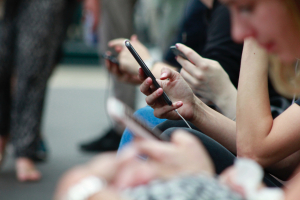How Has Social Media Changed Adoption?
Adoption has changed a lot over the past handful of decades. Country borders have closed and opened, state regulations have shifted, and the online adoption community has begun and grown. With the rise of social media, the adoption community has grown exponentially.
Although social media has grown with adoption supporters ten-fold, completed adoptions have continued to dwindle. So, it seems as if social media hasn’t affected the number of placements in a substantial way. Adoptions have lessened over the years for a variety of reasons: governmental difficulties, cost, smaller families overall, etc.; social media intervention has not been one of those. So, how has social media changed adoption?
Post-Adoption
Social media has had both positive and negative effects on adoption throughout the years. Positively, social media has improved connections on all fronts. Adoptive parents can now reach out to each other, either individually or in support groups online helping them utilize more appropriate trauma responses like TBRI. Parents have been able to find others who have gone through the same thing and offer support while in the trenches of post-adoption difficulties.
Those who are interested in adoption have been able to find support groups online to ask questions and learn some of what they need to know before they take the leap to start an application. They have been able to ask questions about timelines, paperwork-specific queries, and celebrate with others as they pass court. Social media may have improved the confidence of prospective parents as they go through the initial adoption process.
Open Adoption and Reunion
Social media has also made it possible for adoptees and adoptive families to find birth families. It has made connection easier. Now, those with internet access can share photos and stories even if they are oceans apart. Boundaries can be easily respected online with some families choosing to make specific social media profiles just for their children’s birth families to connect with. For those who have adopted internationally, there are safe places to share your child’s birth name so that others can share potential sibling matches. The possibility of connection is endless if both parties have internet access.
International Adoption
It has also improved international adoption trips. It is now much easier to ask for reviews on hotels, restaurant suggestions, flight and airport references, and quick help (like asking experienced adoptive parents where you can find baby food in a foreign country). It has also made it simpler to ask for agency and NGO referrals and reviews, making the early process (potentially) more streamlined. There are groups where people ask for domestic housing for adoptive families needing to travel to another state to bring their baby home. Social media has changed the way people seek our reviews. It is now possible to ask experienced people in real-time.
Support Groups
One of the biggest positives social media has given to the adoption world is its ability to find outside support. Instead of only needing to rely on those you speak to in person, you are now able to find encouragement in those supporters who you’ve never met. Fundraising online is easier. You can now host online silent auctions in fundraising groups, sell t-shirts to other families adopting from the same country you are, or apply for online, social-media-specific, grants. It is now possible to find friends who you have never met but who can support you when you need it the most. I, personally, have made two very close connections with friends in the adoption community that I have only met after we became friends online. They have supported me when I needed them the most, and were always just a message away.
Photolistings
Another huge positive from social media has been photolistings. Especially with those children that have waited a very long time for a family, such as sibling groups or those with special needs, this type of exposure is a great opportunity to find them a family. Without the online world, these children wouldn’t get nearly as much as exposure as they do/deserve. People who have met these children during trips to the orphanages overseas or to foster care events can share with other prospective parents what they have learned about that child. Photos can be shared (publicly or privately depending on the laws and regulations of the country or sharing party).
Although social media does come with its benefits, there are some parts of the online community that people need to weary of. Social media has, oftentimes, caused a great divide in adoption groups online. People who are often more reserved in real life, feel a great sense of confidence behind a keyboard. Arguments occur, points of view are ignored, and things are said rashly all because of the ability to quickly respond without thought. Misconceptions about the process of adoption is often a significant issue online, and one misconstrued comment can mean alienation. Fundraising efforts have been halted because of reactions on the internet, and many people have been hurt by the comments of others.
Social media, like anything, requires careful action. You must be aware of those who can hurt you or your family. But, I want to believe that it has done more good than harm. Children have found families because of social media. Orphan care awareness has been able to spread quickly and efficiently with the simple click of a button. I hope that, one day, if the orphanages continue to remain full, social media can be leader in the reason they may empty. Children deserve families, and I think social media has the power to do the good we need to see in the world.








